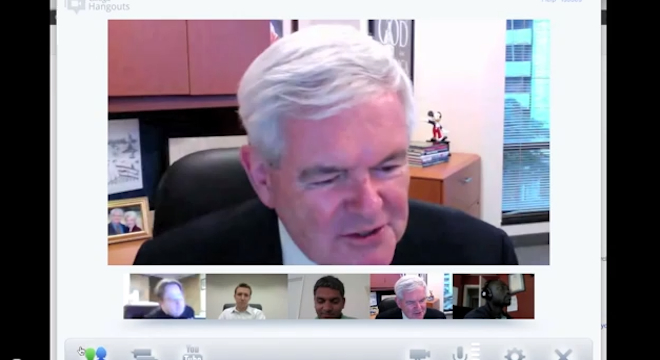Google’s upstart social network, Google + (Google Plus), isn’t just trying to woo the business world, it’s also getting political.
Google quietly posted a Google Plus guide for politicians and candidates recently, offering them a set of step-by-step instructions for creating a Google + Page and connecting with voters and constituents.
As Google explains in the guide:
By creating a Google+ Page for your public office or campaign, you and your staff can promote an issue, platform or cause across the web. You can put a +1 button anywhere on the web that you’d like for people to support your content, and you can connect your Google+ Page to your website and Google search results, via Google Direct Connect. Regularly posting interesting content, engaging with your followers by asking questions, and sharing photos and videos are all ways to keep people coming back for more.
By way of example of how Google Plus can be an asset to politicos, Google also lists a number of politicians already using the service in the ways that the company approves, pointing them to posts by Sen. Bernie Sanders (I-VT), UK Prime Minister David Cameron and the Google Plus Profile Page of Mitt Romney (as well as the Plus Pages for French governing party Union for a Popular Movement and opposition Parti Socialiste.)
Interestingly absent from the list is an early Google Plus political adopter, Republican presidential contender Newt Gingrich, who made headlines in July as the first GOP candidate to join the service just days after its June 28 soft launch.
In his first post, Gingrich promised to begin using one of Google Plus’s key innovative features, the “Hangouts,” function, which allows for simultaneous video chatting between up to 10 users.
And he made good on that promise, hosting to date two Hangout video chat sessions, basically Q-and-As, with voters from around the country. Gingrich then posted the resulting videos to another Google product, YouTube.
Gingrich’s first Hangout session even attracted the attention of Google social networking chief Vic Gundotra (whom early Google Plus users might recognize as the man who defended Google Plus’s controversial “real names” policy, before eventually relenting and allowing psuedonyms and brand pages). As Gundotra wrote of Newt’s first Hangout, “this is fun to watch.”
The Obama 2012 campaign also has a Google Plus Page, created November 14, that Google failed to mention.
But moving beyond Google’s conspicuous omission of Gingrich and Obama in its Google Plus Politics guide, the company’s recommendations for political users highlight just how confusing the social network can be.
In the post’s FAQ section at the very bottom of the page, Google encourages pols to sign-up for Plus using their Google accounts. But then, right below that, Google says that it actually wants politicians and candidates to create Plus Pages, separate from the personal Plus Profile Page that would ordinarily accompany an individual’s Google account.
As Google explains: “If you’re a politician in office, or campaigning, we suggest you create a Google+ Page. With Google+ Pages, your entire Page – not just your posts – can be +1’ed and linked to your office or campaign website and display ads. Since you need to establish a personal profile on Google+ when creating a Google+ Page, we recommend that you use and update only your Google+ Page, not your personal profile, to avoid fragmenting your audience when they search for you on Google+. If you have a staff managing your account, another way to do this is by having a staff member use their name to set up the profile page of the account.”
In essence, Google wants politicians and candidates to begin using the Plus Pages it launched for businesses on November 7, rather than the personal Profile Pages that most individuals on the social network have created, which have been around since the June 28 soft launch of the website. But most of the very politicians Google points to as examples, including Sen. Sanders and Romney, have created Profile Pages rather than Plus Pages. It’ll be interesting to see how hard, if at all, Google encourages these people to create Plus Pages instead.
Finally, the Google Plus guide for politicians also addresses the issue of account verification. Google Plus has offered account verification for celebrities since late August via a small gray check mark icon that appears next to the celeb’s name on their Profile Page. Google says it’ll be offering this same service for new pols and candidates who join the service, but the company’s ability to prevent impostors from popping up has been called into question after someone created an obviously satirical Bank of America Google Plus Page that stayed up for weeks.
That said, there can be no mistaking Google is pushing hard to catch up to Facebook and Twitter when it comes to making Google Plus into a leading social network for everyone — from politicians to businesses to individual users, rolling out specific services and guidelines for each of these distinct subgroups.
So far, though, Google appears to have experienced mixed success in its effort, with the social networking experiencing binges and purges of user interest following every new service rollout. Google Plus counts upwards of 40 million accounts since its June launch, although the service only became public to all users in September. Facebook has over 800 million active accounts and Twitter over 200 million accounts, 100 million of them active.
(H/T: Nextgov)









